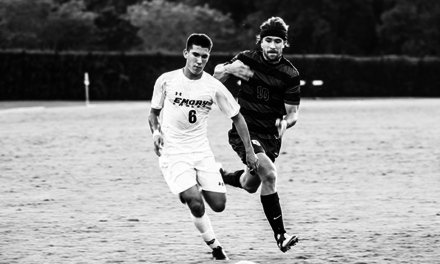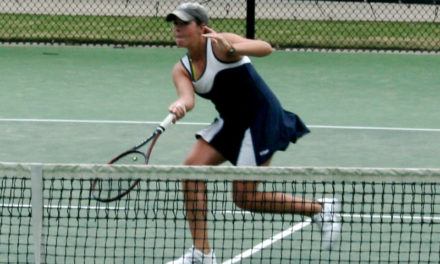U.S. women’s national team forward Megan Rapinoe’s speech after receiving the Best FIFA Women’s Player 2019 on Sept. 23 took an unexpected twist. During the ceremony, held in Milan, Italy, which is notorious for its fans’ racism, Rapinoe talked about how she drew inspiration from stories of resilience in the face of racism across the world.
“Some stories that have inspired me this year [are Manchester City forward] Raheem Sterling and [Napoli defender Kalidou] Koulibaly and their incredible performances on the field,” Rapinoe said. “But the way that they have taken on the disgusting racism that they have to face this year, but probably for their whole lives. Those are the stories that inspire me, but admittedly they make me a little sad, a little disappointed.”
Despite FIFA’s efforts to curb racism, the playing field has grown violent. Hate crimes have increased by 47 percent since 2018 in England, the birthplace of soccer. In an interview, 21-year-old star Chelsea F.C. forward Tammy Abraham said that his mother was in tears after learning that her son was racially abused by fans after missing a crucial penalty during the 2019 UEFA Super Cup against Liverpool F.C. Many complex factors have allowed such prejudice to thrive in professional soccer.
For one, Europe lacks the diversity of the United States. The entirety of Europe has recently experienced a surge of immigration, sparking xenophobic sentiments and popularizing right-wing extremism in several countries.
Robert Claus, an author and expert on right-wing extremism in soccer, spoke about “hooliganism,” or disorderly fan behavior which often includes racist behavior. Claus said that hooliganism in Germany is mostly found within fans with far-right leanings, and the rightward shift in European politics has only fueled the phenomenon.
Along with Germany, Italy has experienced one of the highest immigration rates in Europe, resulting in nationalistic behavior. Some Italians have spent hundreds of years fiercely attacking outsiders, blaming immigrants for a lack of jobs and an increase in crime rates.
In the realm of soccer, Italy is infamous for groups of rabid fans known as “ultras” which is Italian for “beyond.” From drug dealing to murder, “ultra” culture is a primal defense of one’s territory akin to “Game of Thrones.” They often cry racist and pro-facist chants in addition to other violent acts with both racist and non-racist motivations. In 2016, when an “ultra” member killed pedestrian Emmanuel Chidi Namdi, a Nigerian immigrant, ultras sang the killer’s name at each home match in an act of solidarity with the murderer.
Some Italians won’t recognize their behavior as true racism. In 2013, one Hellas Verona fan called his support of Hitler and his use of the n-word, “a dark sense of humor,” a nonchalant sentiment shared by many of his compatriots.
In response to monkey noises directed at Inter Milan forward Romelu Lukaku on Sept. 1, ultra group Curva Nord insisted that racism in Italy is not as bad as other Northern European countries where “racism is a real problem.” In a Facebook post, Curva Nord defended the incident as a sign of respect. This denial and downplay of racism has been common practice for fans who confuse hatred with passion.
Referenced in Rapinoe’s speech, Koulibaly was racially abused by Inter Milan fans in December 2018. Upon hearing the racist insults, Napoli manager Carlo Ancelotti repeatedly requested to stop the game for a stadium-wide warning about the chants in accordance with Italian Football Federation policy. After denying requests, the referee gave Koulibaly a red card for sarcastically applauding his decision. Unfortunately, Italian officials are notorious for not enforcing the federation’s anti-racism policies
Thus, another major reason for why racism has remained in soccer is the lack of punitive measures taken as well as the limited intervention of global organizations like FIFA and UEFA. Despite Inter Milan being forced to play the two subsequent games after the Koulibaly incident in an empty stadium, fans were again caught shouting racist chants against A.C. Milan midfielder Franck Kessie in March 2019.
In response, FIGC issued a flimsy punishment to Inter: a suspended sentence, the closing of one small section of the stadium, to be carried out in one year, with additional racist incidents adding extra sanctions. Arguably, Italy needs a stronger stand against racism. Regretfully, empty stadiums and future punishment were not enough to discourage racism with Inter Milan, but FIFA seems unwilling to intervene beyond their empty “zero tolerance” policy for racism.
Retired goalkeeper, ESPN FC analyst and anti-racism ambassador Shaka Hislop believes that FIFA’s inability to take a hard line on racism is a major concern, and their commitment to combat racism is lackluster.
“I can remember that not so long ago FIFA instituted a zero tolerance [policy] around racism in [the] sport,” Hislop said. “But then when these incidents occur, they are like, ‘Players shouldn’t walk off the field, and it’s just a minority of fans.’ Whatever happened to zero tolerance?
Zero tolerance could manifest in added FIFA funding for high tech listening devices and cameras, which have helped to better detect racism and enact harsher punishments in England and France.
But tolerance starts with the fans. In her speech, Rapinoe referenced the power of fans to enact change. Importantly, Rapinoe argued that all fans and players, not just those targeted, should be concerned for the welfare of fellow teammates.
“If we really want to have meaningful change, what I think would be most inspiring, is if everyone other than [Sterling] and Koulibaly, if they were as outraged about racism as they were. If everybody else was that,” Rapinoe said.
Yet, this racism goes beyond professional European soccer and affects all levels of soccer, right down to the college pitch. Emory men’s soccer captain and senior midfielder Jun Tsuru believes that racism in soccer is largely psychological. From his playing experience, Tsuru said that racism often manifests in “trash talk”, from which he learned valuable lessons.
“I am constantly competing, and I have to deal with things like trash talking that involves racism or prejudices against who I am innately,” Tsuru said. “There is nothing I can do to control it. It might suck at first, but eventually you develop tougher skin. You develop the resilience you need to deal with it and to use that energy to make something productive out of it. At the end of the day, people will say whatever they can to get into each others’ head.”
But professionals like Rapinoe continue to urge fellow players to use their platform to advocate against racism on the pitch.
“That is my ask of everybody,” Rapinoe said. “We have such an incredible opportunity as professional footballers. We have such incredible success. We have incredible platforms. I ask everyone here, lend your platform to other people, lift other people up. We have a unique opportunity in football different from any other sport. To use this beautiful game to actually change this world for better.”
Sammy John (20C) is from Sarasota, FL, majoring in Neuroscience and Behavioral Biology with an Ethics minor. A diehard sports fan, Sammy writes about international soccer and as any self respecting Indian religiously follows cricket. Sammy co-founded Emory Table Tennis Club in 2018, and he enjoys playing soccer and ping pong to unwind.





